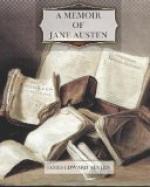Narrative to reach through the greater part of
the first volume; as besides all the circumstances
of his attachment to her mother, and their marriage,
it will comprehend his going to sea as chaplain
to a distinguished naval character about the court;
and his going afterwards to court himself, which
involved him in many interesting situations, concluding
with his opinion of the benefits of tithes being
done away with . . . . From this outset the
story will proceed, and contain a striking variety
of adventures. Father an exemplary parish
priest, and devoted to literature; but heroine
and father never above a fortnight in one place:
he being driven from his curacy by the vile arts of
some totally unprincipled and heartless young man,
desperately in love with the heroine, and pursuing
her with unrelenting passion. No sooner settled
in one country of Europe, than they are compelled to
quit it, and retire to another, always making new
acquaintance, and always obliged to leave them.
This will of course exhibit a wide variety of character.
The scene will be for ever shifting from one set of
people to another, but there will be no mixture,
all the good will be unexceptionable in every respect.
There will be no foibles or weaknesses but with
the wicked, who will be completely depraved and infamous,
hardly a resemblance of humanity left in them.
Early in her career, the heroine must meet with
the hero: all perfection, of course, and only
prevented from paying his addresses to her by some
excess of refinement. Wherever she goes, somebody
falls in love with her, and she receives repeated
offers of marriage, which she refers wholly to
her father, exceedingly angry that he should not be
the first applied to. Often carried away
by the anti-hero, but rescued either by her father
or the hero. Often reduced to support herself
and her father by her talents, and work for her
bread; continually cheated, and defrauded of her
hire; worn down to a skeleton, and now and then
starved to death. At last, hunted out of civilised
society, denied the poor shelter of the humblest
cottage, they are compelled to retreat into Kamtschatka,
where the poor father quite worn down, finding
his end approaching, throws himself on the ground,
and after four or five hours of tender advice and
parental admonition to his miserable child, expires
in a fine burst of literary enthusiasm, intermingled
with invectives against the holders of tithes.
Heroine inconsolable for some time, but afterwards
crawls back towards her former country, having
at least twenty narrow escapes of falling into the
hands of anti-hero; and at last, in the very nick of
time, turning a corner to avoid him, runs into
the arms of the hero himself, who, having just
shaken off the scruples which fettered him before,
was at the very moment setting off in pursuit of
her. The tenderest and completest eclaircissement
takes place, and they are happily united. Throughout
the whole work heroine to be in the most elegant society,




